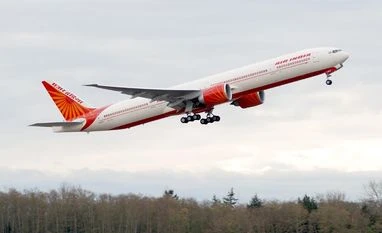Air India has made pre-delivery payment to US-based aircraft manufacturer Boeing for the 220 planes it has ordered, the carrier’s Chief Financial Officer Vinod Hejmadi said on Friday.
Pre-delivery payments (PDPs) are instalments that an airline has to pay the manufacturer when the aircraft are being built. It can amount to about 30 per cent of the price of the aircraft.
A year after being acquired by the Tata group, Air India had in February placed an order for 470 planes — 250 with European plane maker Airbus and 220 with Boeing — in the world’s largest single-tranche aircraft purchase order. The list price for 220 Boeing planes is approximately $34 billion.
In a message to employees, Hejmadi said, “Glad to inform you that yesterday Air India made the payment for PDP to Boeing for the aircraft deal. This was the largest deal in the history of Air India. The funds were arranged from multiple banks at a very competitive rate and converted to $ at the best rates.”
He said the airline had a “very short period” to arrange the funds and the entire deal was ably executed by its finance department and the commercial department.
Air India Chief Executive Officer and Managing Director Campbell Wilson also commended the airline’s executives who were involved in concluding the deal.
“I want to commend the commercial, strategic procurement, finance, treasury and legal teams for successfully putting together a huge financing deal related to our new fleet in remarkably quick time. I’ll not go into details, but it was another historic achievement for the new Air India. Well done to all involved,” Wilson noted.
Also Read
From Boeing, the Tata Group-run airline has ordered 10 wide-body B777X planes, 20 wide-body B787 planes, and 190 narrow-body B737MAX planes, with an option for an additional 20 B787s and 50 B737MAXs. A wide-body plane has a bigger fuel tank, allowing it to traverse directly on longer distances such as India-US routes.
Wilson mentioned that Air India’s teams went to Hamburg, Germany, this week for the Aircraft Interiors Expo. These teams “checked out the latest and greatest seats, inflight entertainment and equipment options for our large fleet of new aircraft,” he noted.
“Lead-times for designing bespoke seats is long and measured in years, so it will be a stepwise journey to the end state, but having joined the team for a day, I am genuinely excited about what we’ll eventually be able to offer our customers!” he said.
Civil Aviation Minister Jyotiraditya Scindia had last month praised the Tata Group for taking a “great step forward” by ordering 470 planes. “I urge his compatriots (other Indian airlines) to do the same because there is too much competition happening on the domestic side, where margins and revenues are slim. Airlines are very comfortable competing on the domestic side because the volatility is low,” Scindia noted.
On the international side, the revenues are much higher. “Your CASK (unit cost) is limited and your RASK (unit revenue) is higher on international routes. But the volatility is much greater,” he added.
“Therefore, the time has come, and I plead with the Indian airlines to take risks and face volatility because India’s flag has to fly in international space,” Scindia had said.
)